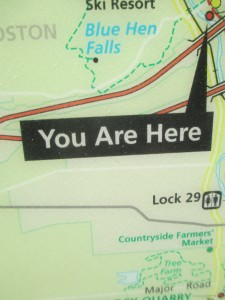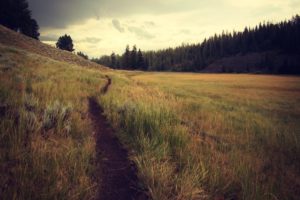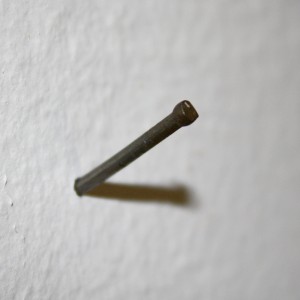“Seeing your photographs last night reminded me of home,” I stammered, shifting my weight to balance my cafeteria tray. I didn’t want to inconvenience the famous man who stood before me, but I needed to say thank you. He smiled graciously. “We come from the same kind of place then,” he agreed. “Yes,” I said, glancing at the steam rising from his clumpy yellow eggs, “and thank you.”
As we nodded and smiled and walked off to our respective tables, I thought about his photographs–photos that saw light in the crumbling walls, vacant houses, and highway overpasses of urban Cincinnati. It was strange how these images of rust-belt decay sparked a kind of nostalgia for my own city of Pittsburgh.
I sat to eat, looking out over the high desert of Santa Fe. “And we are so far away from home,” I said quietly, my mind stretching over the unfamiliar landscape and gathering myself and mr. famous photographer together under this one thought.
****
It was August, and I was in Santa Fe for the Glen West conference, a week bringing together artists who desire to integrate faith with art. We were a motley and spirited crew—writers, musicians, painters, poets, and photographers from zip codes across the U.S. and beyond. We were old and young. Some of us were well-established in our fields, others were just beginning to explore, and many of us were somewhere in-between.
We were, in so many ways, from all over the place.
The larger crowd was divided into groups, according to our workshops. On the first morning I entered my class and met a group of writers. We were all working on creative non-fiction, and most of us were just-a-little-bit nervous. We settled in as we introduced ourselves around the table.
Among our class of fourteen: Sam from Dallas. I would later call him “my first friend from Texas” and liked him all the more when I saw a Flannery O’Conner book tucked between the seats of his SUV. Kristin from Urbana, Illinios. At first her writing talent and experience intimidated the heck out of me, but when we discovered mutual friends I found a kindred spirit. Mary, living between D.C. and Arizona. Her gentle demeanor hid her radical convictions and extensive background in non-profit leadership. As soon as she introduced herself I was determined to get to know her. And finally Lisa from Memphis, whose enthusiastic southern drawl spilled from her mouth and charmed the whole class, “Y’all, I am so thrilled to be here.”
I did not know it at the time, but these four people would become not only friends, but co-conspirators.
****
Our conspiracy was born at a museum cafe over too-sweet Chai milkshakes and green bottles of Perrier. We were talking about blogging, and then we were talking about our frustrations with blogging: It could be lonely. It felt like a popularity contest. It was a lot of weight for one person to carry. It was hard to stay motivated. It was like writing into a void instead of having a conversation.
And I remember when Kristin asked it:
What if we were to blog together?
Our eyes lit up, and ideas spilled out as naturally as Lisa’s southern drawl. A map began to form in our collective imagination, with little push-pins sticking up from Memphis, Dallas, Pittsburgh, D.C. and Urbana. We could write from our particular places on common themes. We could tell stories. We could respond to one another. We could discover shared threads while digging into our own spots on the map.

We could call it, “You are here.”
“And”, (this was Kristin again) “I know this guy. Well, I don’t exactly know his name because he never wears his nametag, but I’ve had two conversations with him, and he’s a writer from Alaska. He strikes me as someone who might be a good fit.”
We nodded, and agreed that Kristin could approach “Alaska-guy.”

His name is Jonathan, and he said yes (with only minor coercion).
In October we’ll begin by introducing ourselves and our places, posting about “Where We Are” and “Where We Came From.” November will be about food, and in December we’ll talk about what it means to be “Out of Place.” Look for several posts every week from a group of writers who are quickly becoming some of my favorite people across four time zones.
And so for Mary from D.C., Kristin from Urbana, Sam from Dallas, Lisa from Memphis, and Jonathan from Anchorage; and for myself, Jen from Pittsburgh, I would just like to say:
We are here. You are here. And here we go.


 rtunity opened up, I would move.
rtunity opened up, I would move.

